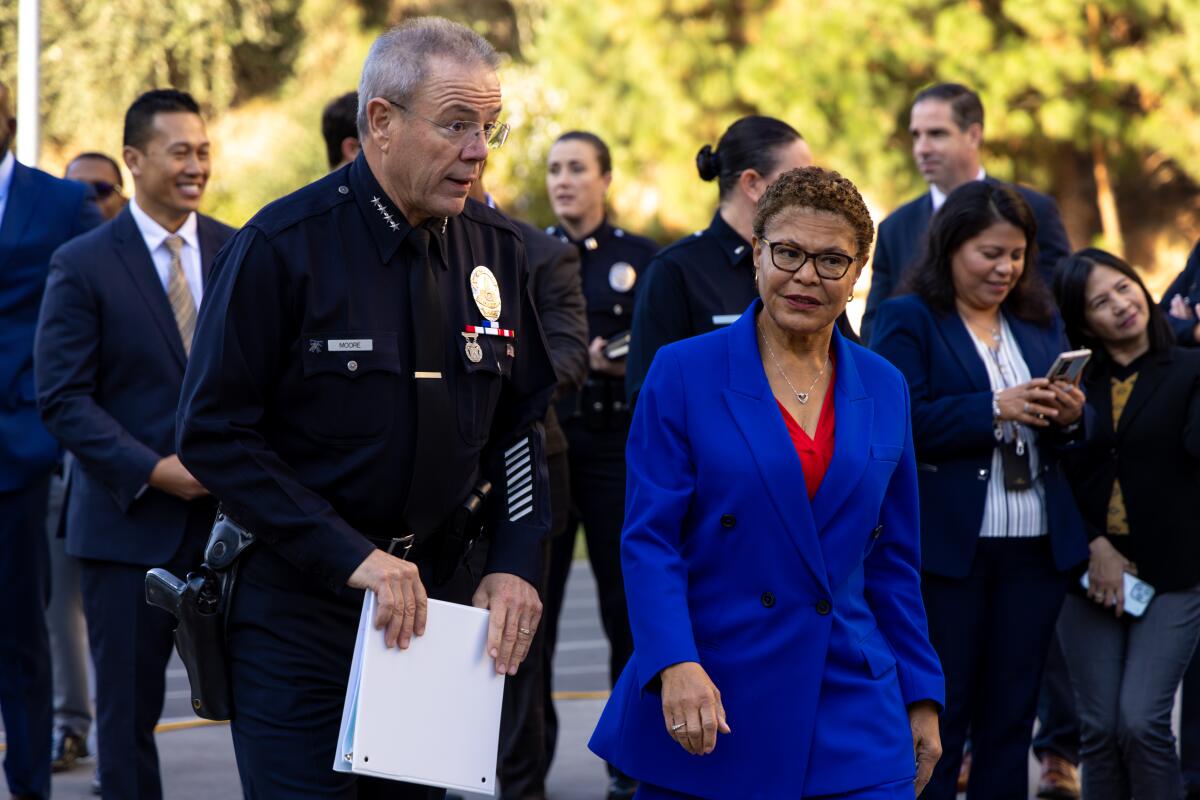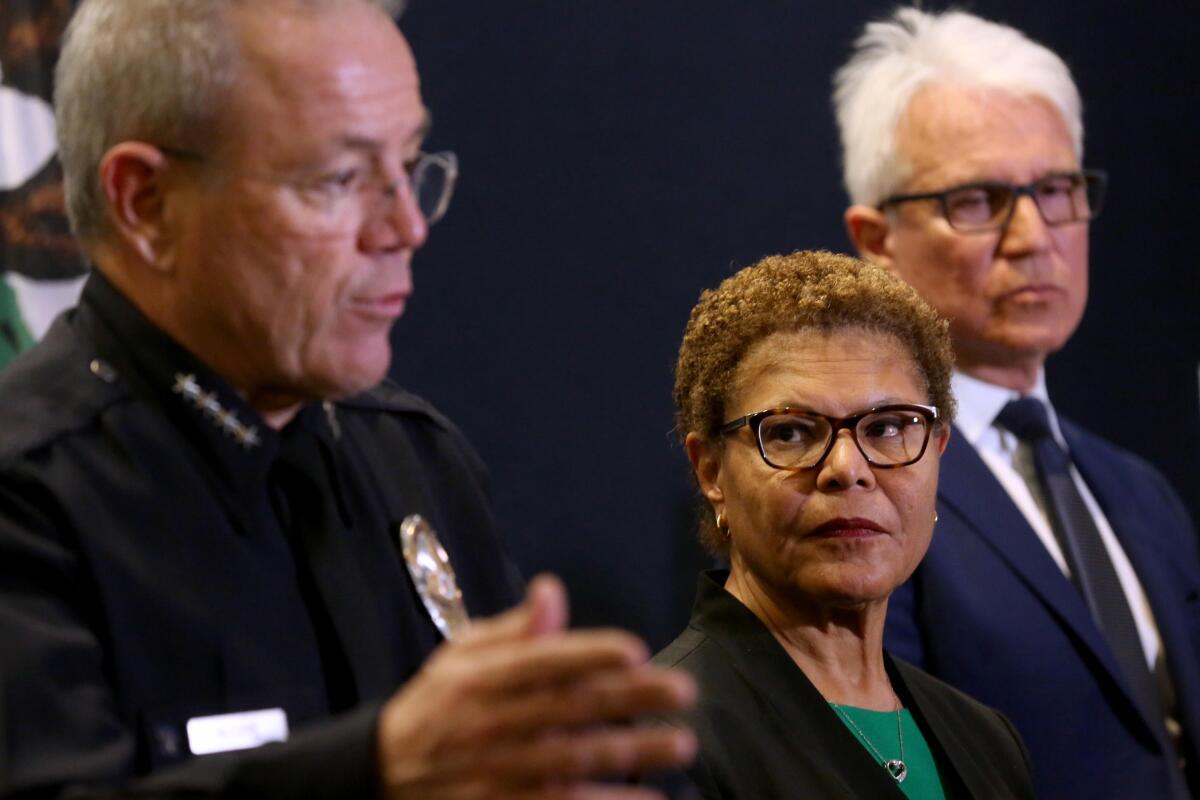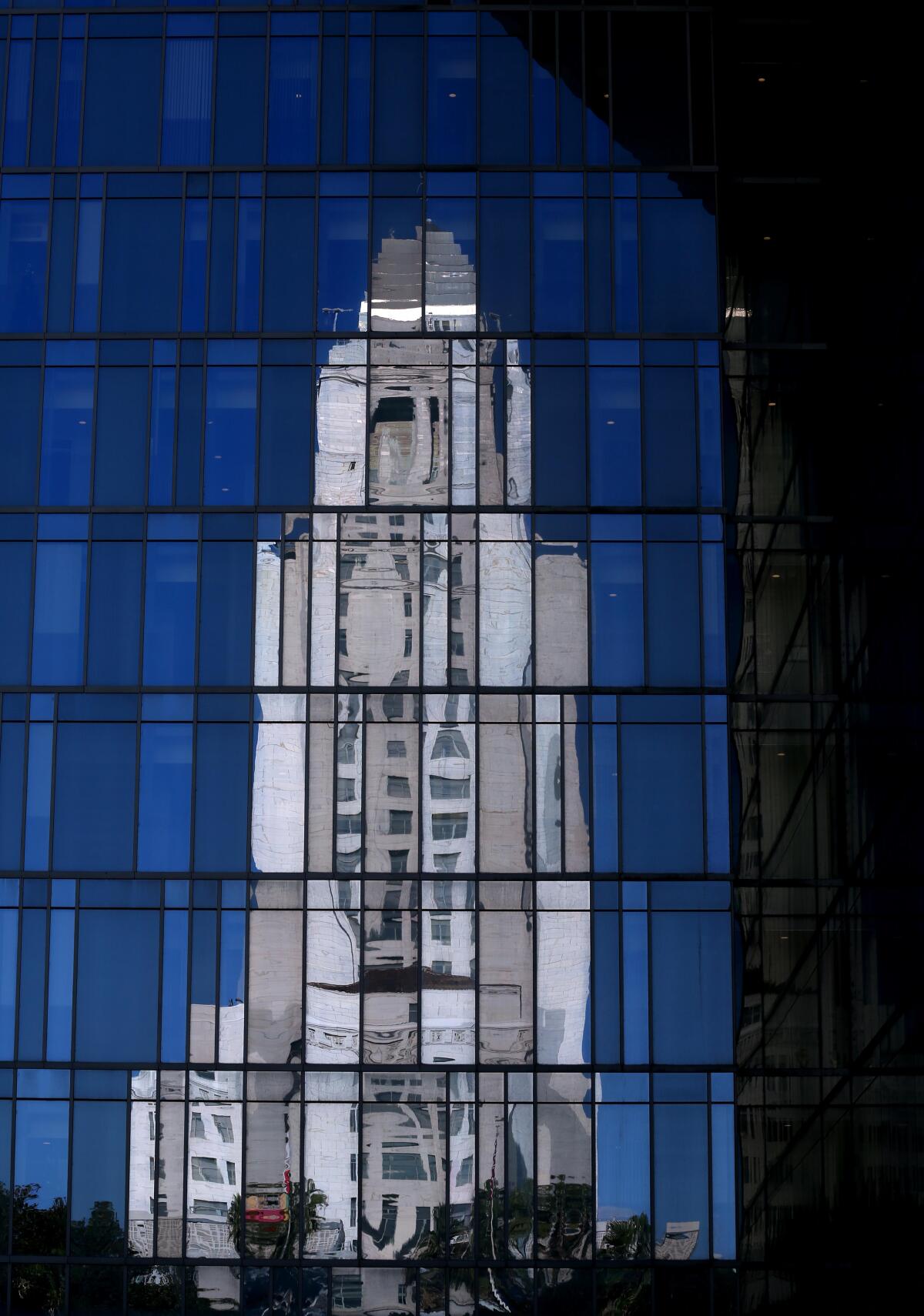Detectives claim LAPD chief sought investigation of Mayor Bass over USC scholarship

- Share via
Two detectives in the LAPD’s Internal Affairs Division say they were ordered to investigate Mayor Karen Bass shortly after her election at the behest of Chief Michel Moore, allegations the chief has strongly denied.
The detectives filed the complaints with the Office of the Inspector General alleging that Moore called for Internal Affairs investigators to conduct an inquiry into a USC scholarship that Bass received.
Bass’ USC scholarship had come under scrutiny during the 2022 election, when her opponent in the mayoral race, Rick Caruso, blasted her for accepting it and later offering legislation that would have given USC and private universities wider eligibility for federal funding. Bass denied any wrongdoing, and the House Committee on Ethics cleared her request to accept the tuition award.
While federal prosecutors did not charge Bass, they said in court papers that her scholarship and her dealings with USC were “critical” to a corruption case involving the university and a top Los Angeles County elected official.
In a message to The Times on Tuesday, Moore said: “The mayor and I have NOT discussed any such investigation by anyone in the department into her USC Master’s Degree in Social Work,” he said. “Additionally, I have no such knowledge of any alleged investigation nor would I initiate any such investigation.”
On Wednesday, after The Times’ story was published, Moore posted a follow-up statement calling the allegations “patently false.”

“The Los Angeles Police Department Internal Affairs Division is restricted in scope to conducting investigations of potential misconduct by Department employees,” the statement read. “I did not initiate, request, or authorize an investigation as alleged in any fashion. This matter is now with the Office of the Inspector General and I look forward to their investigation into these fictitious allegations.”
In their complaints, the detectives said they found Moore’s alleged request, which was relayed by their supervisors, troubling to the point that they ultimately refused the assignment. It’s unclear why Internal Affairs investigators would have been asked to handle such an inquiry.
Moore did not respond to a question about the possibility that his underlings might have misinterpreted him. The detectives’ complaints say it was not clear “how far and to what extent” any subsequent investigation into Bass went. But they said the timing of the request — in early January, as Moore’s future as the city’s top cop was in limbo under the new mayor — led them to question the chief’s motives.
“I believe that using LAPD resources to investigate Karen Bass was improper, unethical and a violation of City ordinances and was done for the personal benefit of Chief Moore to assure his reappointment as Chief of Police,” one of the complaints said.

The competing narratives, between the chief and two seasoned detectives, have once again thrust the normally secretive inner workings of the department into the public spotlight after a string of embarrassing scandals involving LAPD leadership. The latest allegations are not supported by any evidence in the complaints, and neither detective would discuss the case further.
One of the detectives, Jason Turner, declined to comment when contacted by The Times on Tuesday. Attorney Greg Smith provided the Times with a copy of the other detective’s complaint on the condition that they not be identified because they fear retaliation within the department.
The Times asked the Office of the Inspector General if it had received complaints regarding allegations involving Moore and Bass and a spokesperson said it had.
“We have received communications regarding this matter, and we are handling them according to our standard protocols,” the office said in a statement. “In general, when the OIG receives allegations of misconduct against any Department employee, we ensure that a formal complaint investigation is initiated.”
The Times reviewed copies of the complaints and emails showing they were submitted. The first claim was also sent to a member of the mayor’s staff, who confirmed receipt, according to a record of the email reviewed by The Times.
In response to questions Tuesday about the allegations, a spokesperson for Bass said: “Mayor Bass’ focus is on reducing crime. People need to get with that program and stop wasting time and resources on debunked political attacks.”
The complaints say Moore’s order to investigate Bass was relayed by Capt. Divyesh “John” Shah, the head of internal affairs, during a meeting at a Figueroa Street high-rise that houses the department’s professional standards bureau, among other city agencies.
With Moore nearing the end of his first five-year term and seeking reappointment, the detectives said they were uncomfortable with the request to look into the incoming mayor’s prior scholarship.
Turner said another internal affairs supervisor who was present for the conversation, Det. Jason De La Cova, asked him to draw on his connections and experience working in the Southwest Division, where USC is located, his complaint alleges.
The two detectives had already been investigating the university over its connection to Cory Palka, the former LAPD captain who retired last year amid allegations that he schemed to cover up a sexual abuse claim against former CBS Corp. chief Leslie Moonves. Their investigation centered on whether Palka’s daughter, who was a USC student at the time, had received an internship thanks to her father’s cozy relationship to Moonves.
In their complaints, the detectives said Shah and De La Cova briefed them on a meeting about the Palka case with Moore and Michael Rimkunas, his deputy chief in charge of professional standards. Shah suggested the order to investigate Bass came out of that meeting, the complaints say.
After they refused, De La Cova took on the assignment, according to the complaints.
Attempts to reach Shah and De La Cova for comment on Tuesday were not successful.
Questions about Bass’ ties to USC arose last fall when The Times, citing congressional records, reported that she had been awarded a $95,000 scholarship to USC’s social work school without having directly applied. The scholarship led her to be discussed in a federal corruption case involving the school’s former dean, Marilyn Flynn.
Flynn was sentenced to three years probation after she admitted to bribing one-time Los Angeles County Supervisor Mark Ridley-Thomas in exchange for his help securing the renewal of a county contract.
Ridley-Thomas, a former city council member and onetime Bass ally, was sentenced earlier this year to 42 months in prison after a federal jury convicted him of a scheme to extract benefits from USC for himself and his son. The jury acquitted Ridley-Thomas of 12 other charges related to a scholarship and a professorship that his son, Sebastian, received from USC. Bass did not testify during the trial. Ridley-Thomas is appealing the conviction.
In support of Caruso, the Los Angeles Police Protective League sponsored a series of biting campaign commercials that sought to tie Bass to the federal corruption case involving Ridley-Thomas. A lawyer for Bass later sent a cease-and-desist letter to five local TV stations demanding they stop airing the ad.
Bass told The Times last fall that she initially applied to USC’s master’s in public administration program, a degree offered by the university’s Price School of Public Policy, which is separate from the social work school. Bass also said she thought her status as a former USC employee made her eligible for free tuition, but she did not continue when she found out she had to pay for the program.
Despite the controversy, Bass won the election by a healthy margin. The question of whether to bring back Moore as chief was one her first major decisions after taking office at the end of 2022. Under the city charter, the decision on whether to reappoint a police chief rests with the five-member civilian Police Commission But, in practice the final choice effectively rests with the mayor, who appoints the oversight body’s members.
Late last December, weeks after Moore expressed desire to return for a second term, the commission’s president announced that a vote on Moore’s reappointment would be held on Jan. 10 — around the same time as the alleged Internal Affairs meeting regarding Bass’ scholarship. The announcement drew criticism from some longtime department observers, who accused the commission of rushing through its decision without considering Moore’s record.
The vote was delayed after Bass released a statement saying she too felt it was “too soon.” She asked the commission to take it up at a later date.
Moore had faced criticism in some quarters during his first term for his handling of the COVID-19 pandemic, the department’s response to the mass protests of 2020, a botched detonation of a fireworks cache that destroyed a South L.A. neighborhood, and several controversial killings by officers.
The decision to reappoint Moore had been widely expected as several commission members had signaled their support for him. In news interviews and public comments, they called him a strong leader who was familiar with the intricacies of running the LAPD — a massive, multibillion-dollar organization that is constantly under a microscope.
And despite a string of recent controversies, a Loyola Marymount University survey of Los Angeles residents showed stronger satisfaction with the LAPD’s overall performance than in recent years. The one caveat was that swaths of the population still see disparities in the way the department polices Black and Latino residents.
The chief was ultimately reappointed for a second term on January 31. Moore has said he plans to serve only another two or three years to ensure a smooth handoff to his successor.
In recent months, the department has been roiled by accusations of thefts and illegal stops by anti-gang officers in the San Fernando Valley, the inadvertent release of photos of undercover officers, and an allegation that an assistant chief used an Apple AirTag to surreptitiously track an officer with whom he had been romantically involved.
Moore has maintained public support from Bass, who defended the chief and praised his response to the gang unit scandal. They appeared together recently at a news conference at the Police Academy where Bass outlined her public safety bona fides.
But there are also signs of discord. Last month, Bass met with members of the Command Officer Assn. to discuss the direction of the department, according to five people who were present at the meeting or who were briefed on it. They requested anonymity in order to speak freely about what was considered a private meeting. Several attendees spoke of sinking morale and the need for more funding, and a series of written comments that were submitted anonymously and read aloud called for a change in department leadership, the sources said.
Bass repeatedly told the senior officials gathered “I hear you,” according to the sources. She further said she intended to conduct a national search to find the city’s next chief. In the meantime, she said she was busy working to fill other vacancies, according to some of those present.
Times staff writer Matt Hamilton contributed to this report.
More to Read
Sign up for Essential California
The most important California stories and recommendations in your inbox every morning.
You may occasionally receive promotional content from the Los Angeles Times.












